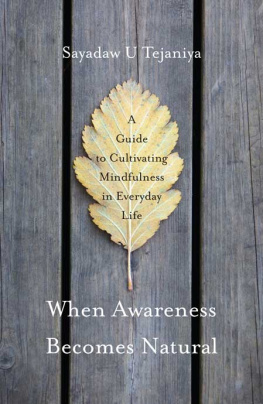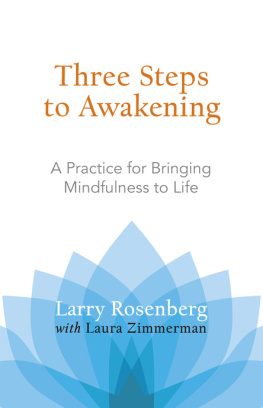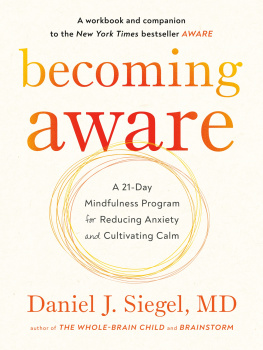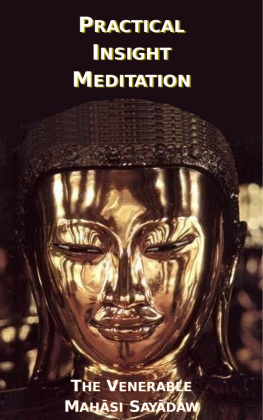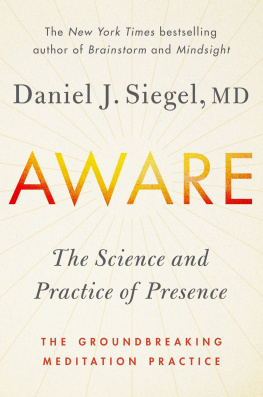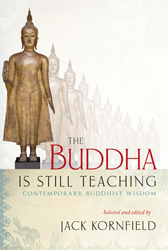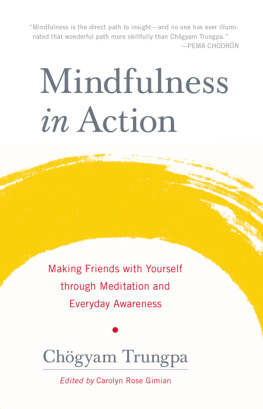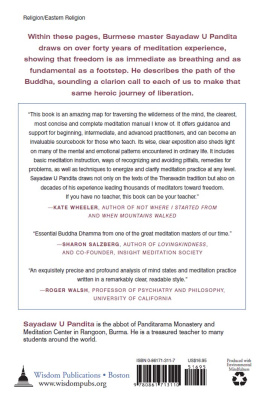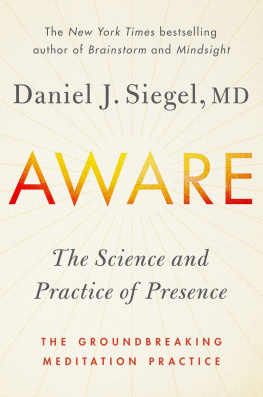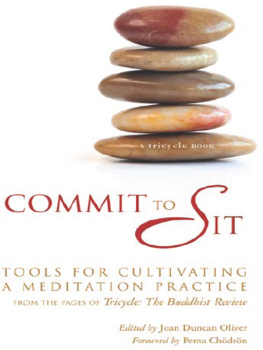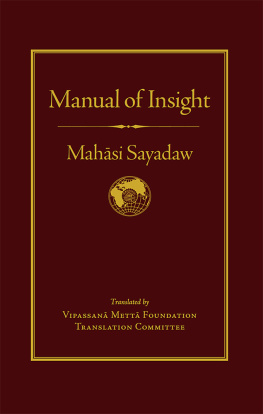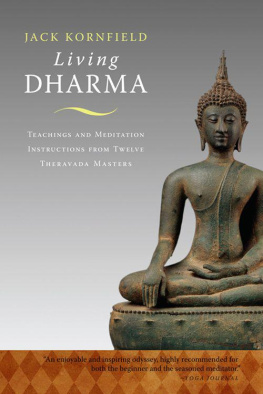This is the work of an eminently skilled meditation master who uses many examples from his own life and practice to help us understand and free our minds. There is both simplicity of expression and subtlety of understanding in Sayadaws teachings, and they will be of great help to both beginning and experienced meditators. Highly recommended.
Joseph Goldstein, author of Mindfulness: A Practical Guide to Awakening
A wonderfully fresh and lively contribution, rooted in classical Theravadin tradition and at the same time of practical and contemporary relevance, illustrated by intimate, vivid personal examples of how dharma practice can help us all learn how to live with more wisdom and kindness.
Larry Rosenberg, author of Breath by Breath: The Liberating Practice of Insight Meditation
ABOUT THE BOOK
The flame of wisdom can be kindled in the midst of any life, even one that might seem too full of personal and professional commitments to allow for it. Such is the teaching of Sayadaw U Tejaniya, who himself learned to cultivate awareness in the raucous years he spent in the Burmese textile business before taking monastic ordination at the age of thirty-six. Train yourself to be aware of the clinging and aversion that arise in any situation, he teaches. If you can learn to do that, calm and deep insight will naturally follow. Its a method that works as well for sorting the laundry or doing data entry as it does in formal sitting meditation. The object of attention is not really important, he teaches, the observing mind that is working in the background to be aware is of real importance. If the observing is done with the right attitude, any object is the right object.
SAYADAW U TEJANIYA is a Burmese monk in the lineage of Mahasi Sayadaw who teaches meditation at Shwe Oo Min Dhamma Sukha Forest Meditation Center in Yangon (Rangoon), Myanmar. Hes unique among the more high-profile monastic teachers of his tradition in that, though he began practice under his teacher at age thirteen, he didnt enter monastic life till he was nearly fortyafter an active career in his familys textile business. His teaching emphasizes the application of awareness to every aspect of life, de-emphasizing the centrality of practice forms even as he teaches them rigorouslyand his style is relaxed, funny, and informed by his intimate knowledge of the workaday world. He has taught in Australia, China, Great Britain, the Czech Republic, Indonesia, Israel, New Zealand, Poland, Singapore, Switzerland, and the United States.
Sign up to receive news and special offers from Shambhala Publications.

Or visit us online to sign up at shambhala.com/eshambhala.
When Awareness Becomes Natural

A GUIDE TO CULTIVATING MINDFULNESS IN DAILY LIFE
Sayadaw U Tejaniya
Edited by Robert French
Foreword by Steven Armstrong

Shambhala
Boulder
2016
Shambhala Publications, Inc.
4720 Walnut Street
Boulder, Colorado 80301
www.shambhala.com
2016 by Sayadaw U Tejaniya
Photographs 2016 Zack Hessler
Cover design by Graciela Galup
Cover art: Cultura RM/Oscar Bjarnason/Getty Images
All rights reserved. No part of this book may be reproduced in any form or by any means, electronic or mechanical, including photocopying, recording, or by any information storage and retrieval system, without permission in writing from the publisher.
Library of Congress Cataloging-in-Publication Data
Names: Tejaniya, Sayadaw U.
Title: When awareness becomes natural: a guide to cultivating mindfulness in daily life / Sayadaw U Tejaniya; edited by Robert French; foreword by Steven Armstrong.
Description: First Edition. | Boulder: Shambhala, 2016.
Identifiers: LCCN 2015032729 | eISBN 9780834840164 | ISBN 9781611803075 (pbk.: alk. paper)
Subjects: LCSH: MeditationBuddhism.
Classification: LCC BQ5612.T38 2016 | DDC 294.3/4435dc23
LC record available at http://lccn.loc.gov/2015032729
To my parents and my teachers
We meditate to develop right view.
This cannot be achieved by the ego; meditation must proceed naturally by watching any experience just as it is.
This is the way to develop right view.
SHWE OO MIN SAYADAW
What follows is a practical guide for the wise application of mindfulness of mind in our daily lives.
It is refreshing to hear the liberating teachings of the Buddha taught in a way that is simple, nondogmatic, practical, and suitable for our times, our place, our lives. U Tejaniya is just such a teacher. He discourages ambitious spiritual athleticism. He cautions us from becoming meditative technicians. He doesnt mistake experience for wisdom. He points out the danger of seduction by emotions and by attachment to false promises of spiritual goodies, such as calm, concentration, clarity, and joy.
He offers instead the practice of perseverance and mindful awareness in our daily lives, where we simply relax and attend to all experience, letting them all come and go. From this, wisdom grows naturally.
I first met Sayadaw U Tejaniya in 2005 during six weeks of intensive practice. During that time he offered me generous and extraordinary access to his teaching. In those exhilarating first weeks and in continuing to train with him over the ensuing ten years, I have benefited from his guidance and have integrated his teachings to complement other meditative practices I offer. Many Western dhamma students have found their way to Sayadaws teachings, and I am happy to introduce you to these teachings here.
Uncharacteristically for Burmese monks, Sayadaw generously shares the wisdom he learned from his trials and errors in life. U Tejaniya has had a unique journey to becoming a meditation master. His dhamma biography proceeds in fits and starts through the youthful follies of delinquency and drug use and abuse. As a young adult, he was challenged with severe depression multiple times. He experienced all the trials of an active householders life of family and economic obligations. His life now includes taking on monastic commitments and the responsibilities of guiding others along the way.
At every step on his path of awakening, U Tejaniyas journey inspires us. Through his experience we clearly see how the liberating wisdom of the Buddha is available to us right now, whatever our lifestyle, through the steady and determined application of mindful awareness. Informed and guided by his lifelong relationship with his own teacher, the late Shwe Oo Min Sayadaw (Gold Cave Hermitage Monastic Teacher), U Tejaniya continually experimented with mindful awareness. By his practice of mindfulness, especially in remaining mindful of his challenges, a natural wisdom matured into his unwavering commitment to a lifestyle of awareness.
Sayadaw assures us that the process of kindling the flame of wisdom is possible within the bounds of our full personal, professional, and civic commitments. His evolving understanding of awareness and wisdom has resulted in profound insights into the Buddhas teaching on the four foundations of mindfulness.
Sayadaw offers the information that supports the skillful application of awareness of the minds activity in practice. He consistently emphasizes recognizing the mind, whether in his initial instructions for understanding the dhamma, in his teaching on awareness practice, or in writing about the challenges well meet on the path. He offers teachings on the most effective attitudes of mind for practicing mindfulness and gives a realistic appraisal of the possibility of liberation from suffering in our lives through the recognition of the mindfulness of mind.
Next page
